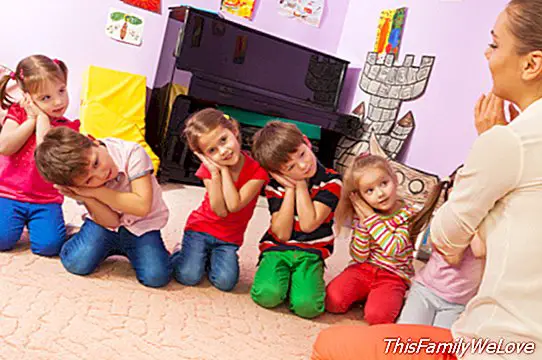Child socialization: practices to relate to others
The child's ability to socialize, to relate to others, is acquired from the first years of life. If we take into account that more and more children are attending the preschool center or the day care center, where they maintain contact with other children, child socialization begins every time before and outside the family. Learning to be sociable is an important capacity that must be educated in the child, both in the family and in the preschool school.
The game stimulates children's socialization
Children from very young seek to establish a relationship with their peers. However, the way in which this relationship is configured is changing: during the first months, the child seeks social contact unconsciously with adults through the smile, the looks, the noises, or, simply, reaching out Little by little, these behaviors become conscious on the part of the child.
These changes are observed in recreational activities such as children's games:
1. Play in parallel. At first, children are able to play together, although at no time these games are intertwined. It is what has been called game in parallel.
2. Symbolic game. Around 18 months, the interaction of the child in the game changes: it begins what is known as symbolic play, that is, playing with something "as if it were" different (a box as a racing car, a pencil to mode of hairbrush, etc ...) in a game that can be played by the rest of their peers. Therefore, it will be interesting to promote this capacity for socialization in a natural way, giving opportunities to the child to play with other children "as if it were".
Imitating the adult, children's socialization is trained

- Transmission of social values. It is through the imitation of the adult how the child learns to function in society, learning that will translate into their relationship with their peers. Therefore, if we want our children to learn a series of important social values for us, we must start because the child sees in us the model of social behavior that we want to transmit.
- Control of emotions. It is true that, in addition to imitation, in the child his own temperament and his own character are manifested. Therefore, during early childhood, the control of the emotions of the child should be the task of adults (mainly parents and educators), so that the child is gradually taught to self-regulate their social behavior.
Social behaviors of children
Sociality is learned from the cradle. These are some concrete aspects of the child's social life. All arise naturally and spontaneously as a result of the development and growth of children, but all can be oriented and be part of the education of children.
1. Well-being At three years, the child must identify and manifest the most frequent needs with their physical well-being (hunger, thirst, cleanliness, etc.) and take the necessary actions to satisfy them. Therefore, all the activities of the program are aimed at promoting this type of relationship in the child.
2. Socialization. Interactive behaviors are aimed at the attainment and development of affective bonds, the acquisition of knowledge and the formation of habits desired by parents and educators and the control of emotions. For this reason, aspects related to the education of socialization are particularly important.
3. Autonomy. In these early years, the child will go from a total dependence on the adult in care, hygiene and health, to be partially helped by it and end up being relatively autonomous in the performance of these activities. There are a series of exercises to stimulate children's autonomy.
4. Expression of emotions. At this age, the child is already able to express their own emotions (sadness, anger, joy or surprise) and recognize them in others, as well as being prepared to demand and receive affection, to increase their knowledge and to participate in the group social to which it belongs.
Marisol Nuevo Espín
Advice: Sonia Rivas. Pedagogue
For more information: Educate for coexistence. Social relations of children from 2 to 7 years old, of Editorial Palabra. Author of the book:José Fernando Calderero, Doctor of Educational Sciences from the Complutense University.
Click here if you want to get a free sample of the first chapter of the book.




